The Ballad Of Victim A: Why The Shohei Ohtani Betting Scandal Makes Zero Sense
The Ohtani-Mizuhara situation and subsequent affidavit is a Gong Show of inconsistencies, half-truths, and betting activity of a volume and nature that is hard for people to comprehend.

10 Questions That Attempt To Unpack The Ippei Mizuhara Affidavit
This past Thursday, news involving two very innocent sports starts overshadowed the first round of The Masters.
O.J. Simpson died unexpectedly of cancer.
And Shohei Ohtani was rushed by the powers that be on a conveyor belt toward exoneration in the mother of all gambling affairs involving his interpreter, Ippei Mizuhara.
Fortunately, for all involved, Ohtani's case is open and shut. An affidavit last week charged Ippei with bank fraud, and painted a picture of $16 million worth of deceit in voluminous, often nonsensical detail.
Investigators – in a case involving more than $300 million in illegal bets, $40 million in losses, 25 bets per day of on average $12,000 each, and many separate instances of at least six-figure wire fraud, all occurring over a matter of years – have spent a very long and arduous two and a half weeks piecing everything together, and rest assured, it all checks out. The affidavit concludes, and the party line of Baseball echoes, that as far as Ohtani is concerned there is no longer anything to question or see here.
It was all done in secret by the translator, a devious and degenerate addict, who has confessed to the crime at metaphorical gunpoint and has now been dispatched.
U.S. Attorney E. Martin Estrada, the prosecutor in the case, after people barely had time to mentally download the latest version of the truth last week, emphasized on the bully pulpit so emphatically that Ohtani was a victim that he nearly lost his voice. He seemed at times more focused on the side note – Ohtani's victimhood and how sparklingly innocent he was – than the main story of Ippei's alleged crime.
Dodgers manager Dave Roberts is just happy that this is "all behind" the team. Now they can "move forward" and focus on baseball. "I think for us, we’ve already moved past it, to be quite honest with you," NBC Los Angeles quoted him as saying. "Ohtani addressed us earlier, we felt good about it and supported him." Well, that's just great.
Tiny apparatjik and self-professed "non legal expert" Ken Rosenthal sought out his preferred opinion - that Ohtani's case is open and shut - in a piece in The Athletic in which he labelled those who disagreed with him as conspiracy theorists who just... seek out their preferred opinion. (This is the same man who recently spoke, his head next to a floating sponsor logo from a legal betting company, on a TV network owned and operated by a sports league, to the idea that sports leagues are compromised now by taking money from legal betting companies whenever scandals like Ohtani's occur in the illegal betting market).
Even ESPN, the outlet responsible for breaking the story and obtaining the very first, unpublished, and highly relevant interview with Ippei in Korea on Tuesday, March 19, has moved on. Two days after the affidavit came out, and the morning after Ippei appeared in court (and did not enter a plea), ESPN's lead baseball story spoke to how the Dodgers dugout is "coming together" in the face of recent adversity posed by the investigation.
The photo: Ohtani high-fiving several teammates.
The pull quote: "We speak the same language of baseball."
I'm dumber for having typed that out, and you're dumber for having read that, which is how you know it's PR. (More on PR, below).
By Rosenthal's own definition, we here at Robn aren't conspiracy theorists because we don't have a preferred conclusion. We don't have any conclusions, other than 1)
What The Hell Is Going On? and, 2) Investigators sacrificed the logic of a fully questioned fact-pattern so that this case can begin to be forgotten about by the general public, like someone dictating a 10-course Michelin star menu be served through a drive-thru window with the manager shouting to the staff to speed the service up.
And make no mistake, this is the French Laundry of illegal sports gambling affidavits.
We don't know what we believe because this situation is a Gong Show of inconsistencies, half-truths, Sanduskian levels of "I never saw anything," and betting activity of a volume and nature that is hard for even some in the betting industry, let alone the general public, to comprehend.
But if we were trying to understand the situation more, rather than join the circle of back-patters echoing that there's nothing left to understand, we might ask the following 10 questions.
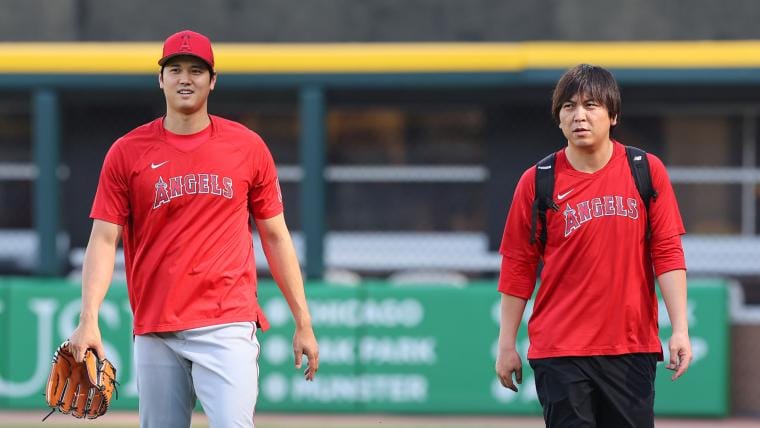
1. Why Did Ohtani's Camp Initially Have Ippei Do An Interview In Which Ippei Said Ohtani Paid Off Ippei's Gambling Debts?
Per ESPN:
- On Sunday, March 17th, MLB Commissioner Rob Manfred was informed generally of what was coming down the pike with Ohtani. So, as of this day, MLB knew.
- On Monday, March 18th, ESPN informed Ohtani's agent that it has documentation of wire transfers from Ohtani's bank account to an illegal bookmaker's bank account. So, as of this day, Ohtani's agent knew. Ohtani's agent immediately hired a crisis communications spokesman. Separately, Ohtani's agent and Ohtani spoke about the transfers, but apparently only through a duplicitous Ippei (common theme), and so the story translated to the agent by Ippei did not reflect what Ohtani was actually saying, and the agent's responses translated back to Ohtani by Ippei did not reflect what the agent was saying.
Ohtani didn't know anything.
- On Tuesday, March 19th, Ohtani's "camp" - but without Ohtani's knowledge or involvement at all - agreed for Ippei to have an interview with ESPN and decided what the message in that interview was going to be. Ohtani's spokesman coordinated this interview, the story pertaining to which would ultimately go unpublished. So, as of this day, Ohtani's spokesman knew.
Ohtani still didn't know.
- Then, late that evening of the 19th, Ippei gave ESPN an initial interview in which he told an elaborate, specific account of Ohtani agreeing to pay off Ippei's gambling debts – Ippei claimed they even made the wire transfers together – but also stated that Ohtani didn't know they were gambling debts. Ippei claimed he was borrowing money from friends and family to stay financially afloat, and that he was living paycheck to paycheck. Ohtani's spokesman sat in on the interview with Ippei.
Following this interview, Ohtani still didn't know.
- On Wednesday, March 20th, Ohtani's attorneys completely reversed course on Ippei's story, publicly claiming Ohtani was a victim "massive theft." By now, the story is on every sports media outlet in the universe.
Following these published reports, after his lawyers came up with a definitive statement of Ippei's guilt, Ohtani still didn't know.
This inspires incredulity.
But let's return to the core question. Why did Ohtani's own people set Ippei up for an interview with ESPN to say what he said?
From the original ESPN story:
Initially, a spokesman for Ohtani told ESPN the slugger had transferred the funds to cover Mizuhara's gambling debt. The spokesman presented Mizuhara to ESPN for a 90-minute interview Tuesday night, during which Mizuhara laid out his account in great detail. However, as ESPN prepared to publish the story Wednesday, the spokesman disavowed Mizuhara's account and said Ohtani's lawyers would issue a statement.
The most important words in that quote are "a spokesman for Ohtani."
ESPN and other outlets endeavored to speak with Ippei for months after receiving a tip from a source about Ippei, and repeatedly asked for an interview. If Ohtani's camp finally granted ESPN that interview, during the ceremonious, puff-piece media time of Opening Day, and if the content of that interview, which involved a major bombshell, was coordinated by Ohtani's own spokesman, then the Ippei interview = Ohtani's camp communicating the Ohtani camp's preferred version of the story through Ippei.
It is fanciful to believe that Ohtani's own spokesman curated this interview and, given the subject matter, just told Ippei to go out there and wing it, and while sitting in on the interview didn't intervene to stop it if it went off-script. Such a move would be antithetical to every impulse of those trying to carefully script a public image (and keep their job).
After Ohtani's lawyers issued their statement, ESPN's investigative reporter Tisha Thompson had this very-not-sketchy exchange with Ippei. (The non-quoted questions are from Thompson to Ippei, the quoted portions are Ippei's responses).
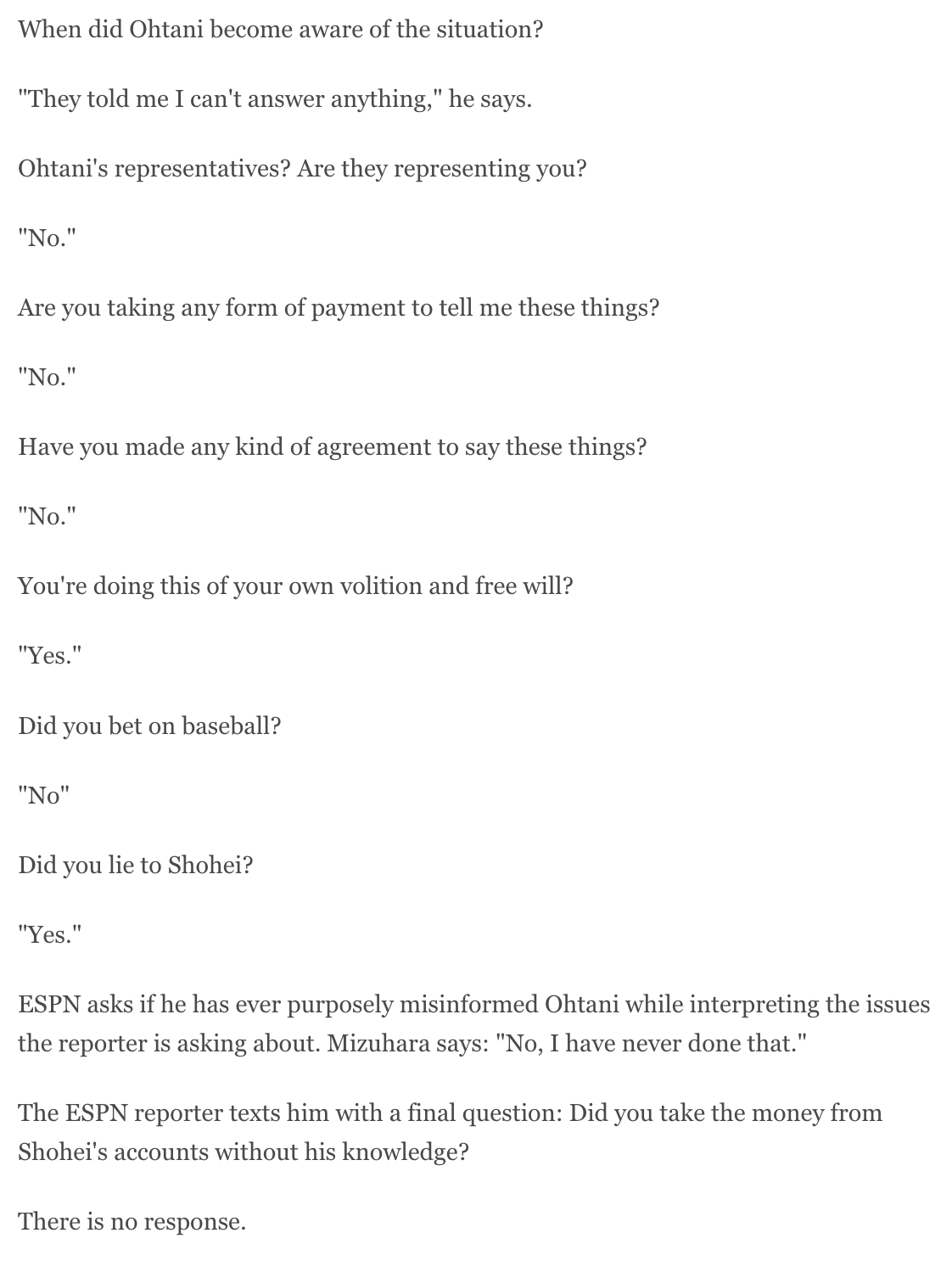
If you're Ohtani's camp, much less baseball – both of whom knew about the wire transfers at this stage – you don't open up this hornets' nest nightmare of an interview topic on one of the most carefully scripted and anodyne media days of the baseball year unless doing so saves you from something worse.
What did Ohtani's camp think they were saving themselves from by doing this interview?
If Ohtani knew nothing about Ippei's betting, then why did anyone direct Ippei to talk to the press at all? Ohtani's people work for Ohtani. That's why they're his people.
Did Major League Baseball sign off on the interview? If so, why on God's Earth did they?
Who told Ippei before the initial interview what to say, and why? Again, this is PR. This was choreographed. And because this was choreographed by Ohtani's PR, it is reasonable to default to the assumption that Ippei's message was the Ohtani camp's message, unless presented with evidence to the contrary. Why would Ohtani want this message out there?
One guess is that ESPN gave Ohtani's camp an ultimatum: talk to us or we'll run what we have. If so, given the nature of the subject matter, how is it possible that the script-writing could have been left just to a crisis communications person on their second day on the job and Ippei himself?
Ohtani's own lawyers also never thought to tell Ohtani that they were huddling together to correct this story? They never consulted Ohtani, as his counsel, about what Ohtani wanted the story to be? They never gave Ohtani a heads up that, not only had his best friend already talked to the press about him, but that they were going to popularize a story that contradicted everything Ippei said? They never gave Ohtani a heads up that he was the victim of massive fraud?
And lastly, if the only person communicating the story between the victim and the victim's handlers is the self-admitted perpetrator, then why did the people involved not get another communicator?
To that final point, there was at least one other Japanese-English translator with the team that very day...
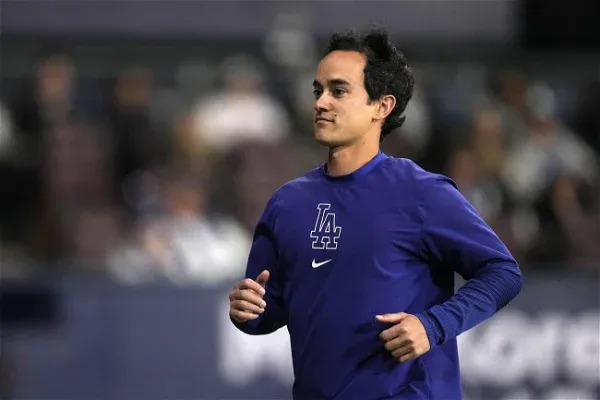
2. Where The Hell Was Will Ireton?
Before this betting fraud scandal came to light, the most damning betting fraud scandal involving a pro sports team employee was that of the Jacksonville Jaguars' Amit Patel. Now just a quaint memory, Patel's scheme involved embezzling $22 million from the Jaguars, and then losing the vast majority of that money playing fantasy sports at FanDuel over a series of years before FanDuel finally noticed.
But there are two critical differences between Ippei's case and Khan's case that give context to the former.
Ippei's case a) has nothing to do with the legal betting market, and no matter how much you dislike the legal market, could never have legally, functionally or otherwise occurred in said market because the legal market can't award even one cent of blind credit (i.e. credit awarded on a verbal promise as opposed to from a card charge), let alone millions of dollars, b) makes the Khan case look like a mere dalliance.
Just as FanDuel didn't know for years about Khan's activity, Ohtani didn't know for years that his money was missing or that his best friend had a habit for which the word "addiction" is too grievous an understatement.
Let's set aside Ohtani not knowing about it for over two years, and also not knowing about it after MLB knew, after his agent knew, after his PR person knew, after Ippei spoke to the press about the subject, and even after Ohtani's own lawyers started issuing statements on the matter.
The affidavit states definitively that Ohtani did not know anything even after the Dodgers' staff and entire team were told by Ippei about Ippei's massive fraud during a team meeting at which Ohtani was present.
In fact, the first time Victim A learned that MIZUHARA had gained access to the x5848 Account was on or about March 20, 2024, after an MLB game in Seoul, Korea.
Following the game, Victim A’s team was assembled by team management in the locker room, and members of team management addressed the players, followed by MIZUHARA addressing the entire team, in English. No one translated what was said at this meeting to Victim A, and he did not understand most of what was said in English, but Victim A was able to understand there was an issue involving MIZUHARA. Following the team meeting, Victim A asked MIZUHARA what the issue was, and MIZUHARA told Victim A that they needed to speak privately.
Victim A and MIZUHARA then spoke at the team’s hotel later that evening. During that conversation at the hotel, MIZUHARA disclosed to Victim A for the first time that MIZUHARA had substantial debts from illegal gambling, and that MIZUHARA had been paying his bookmaker with funds from the x5848 Account.
So, a team meeting at which Ohtani was present featured a bombshell confession from Ohtani's best friend, in English, that was about Ohtani, and Ohtani's reaction afterward was basically, "Um, hey guys, what was that whole talk about?"
And not only did no one tell Ohtani what it was about, including current Ohtani translator Will Ireton who spoke both Japanese and English and was on the trip with the team, but Ohtani let it lie when Ippei basically said, "Let's talk privately, later at the hotel, then I'll tell you everything."
Oh, OK Ippei.
This merely reflects the insanity of a purported four-day fact pattern. What about the 26 months preceding those four days? Remember: Ohtani never knew about Ippei's gambling over the 26-month period during which the gambling allegedly occurred, either. Speaking of which:
2b. Why Does The Affidavit's Conclusion That Ohtani Didn't Know About Ippei's Gambling Rest On Obviously Incomplete Evidence?
The principle point of evidence in the affidavit that supports this claim, is that forensic searches of both Ohtani's and Ippei's phones contained no written messages between the two about betting, Ippei's debts, authorizations of wire fraud, or the illegal bookmakers.
Two people not texting about a topic, particularly when they spend many hours huddled together on most days, doesn't prove that the two people didn't communicate about said topic.
It's the equivalent of sensing a smoking gun, searching one room in a house for the gun, not finding it, and concluding that the whole house is clear.
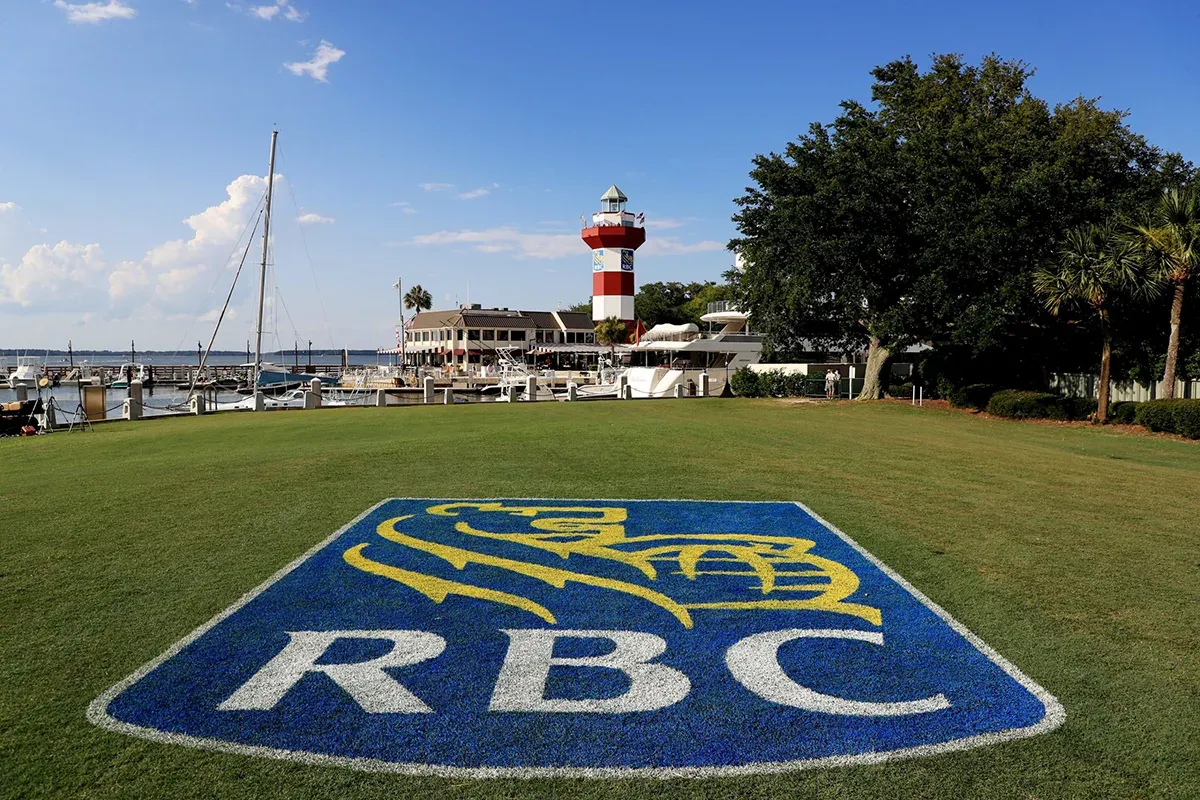
3. How Did Ohtani's Lawyers Conclude In A 12-Hour Period Between Tuesday, March 19 And Wednesday, March 20 That Ippei Had Committed Massive Theft?
The timespan here is again taken from ESPN's helpful timeline article of the events as they unfolded.
As detailed above, Ohtani's spokesman told ESPN that he, Ohtani's agent and Ohtani himself were all duped on March 19th and 20th, because the single point of failure (Ippei) controlling the communication between Ohtani and everyone else was the perpetrator himself, and the perpetrator was lying to everyone involved.
But if this was the case, how did Ohtani's camp between 10:30pm ET on Tuesday, March 19th and 11:00am ET on Wednesday, March 20th figure out definitively that Ippei was lying?
Clearly, if Ohtani's lawyers had cause to believe Ippei was lying prior to March 19th, they would have told their client, right? Or at the very least made it clear to Ohtani's agent, PR people, etc. that no one, especially Ippei, was to go freelancing to the press. Right?
The lawyers' statement to the media, after all, began with, "In the course of responding to recent media inquiries...". So, it appears likely that the lawyers somehow figured out that Ippei was guilty of massive theft after the interview or after ESPN reached out to Ohtani's lawyers regarding the interview.
Except, as is established by the affidavit and as we chronicle in detail later on, no one in Ohtani's camp had access to the bank account in question, except Ippei. His lawyers therefore couldn't look at the financial records and verify the transfers existed at all - regardless of who authorized them.
More importantly, even if Ohtani's lawyers did have access to the account, no one during this time ever verified with Ohtani whether Ippei was telling the truth or not, because 1) Ohtani claims he was unaware of any of this until the night of Wednesday, March 20th, when Ippei told him about it for the first time, and 2) even if someone did ask Ohtani about it, Ippei was the only possible person on Earth who could translate for Ohtani and was spinning more elaborate webs left and right than even Charlotte herself. Isn't the reason why everyone was so bamboozled once the truth came out was that Ippei was the sole mechanism that Ohtani could communicate with the outside world?
Per ESPN:
What had actually happened in recent days was that Mizuhara had been able to control information to Ohtani in his position as the interpreter, and Ohtani hadn't realized what was happening until the postgame clubhouse meeting, when a new interpreter was brought in.
"He didn't know any of it, didn't know there was some inquiry," the spokesman says. "After the game, that's when he found out. ... He didn't know what the f— was going on."
Were Ohtani's lawyers somehow tipped off by law enforcement that Ippei was lying? If so, what did law enforcement have to share with the lawyers that definitively proved Ippei was lying? Did law enforcement just happen to contact Ippei's lawyers in the specific 12-hour window in question?
The alleged "smoking gun" text message from Ippei to the illegal bookmaker saying that Ippei "technically" stole from Ohtani was only sent that same day, Wednesday, March 20th, and was sent by Ippei to the illegal bookmaker after press reports came out featuring the lawyers' accusations of massive theft.
Is it possible that when they got into work on the morning of Wednesday, March 20th, Ohtani's lawyers learned of what Ippei said to ESPN or were contacted by ESPN for comment, had no idea whether it was true or not but briefly shat themselves, and then wanting to get ahead of the story that they anticipated being published, decided that Ippei was lying and therefore issued a stern denunciation of Ippei's comments?
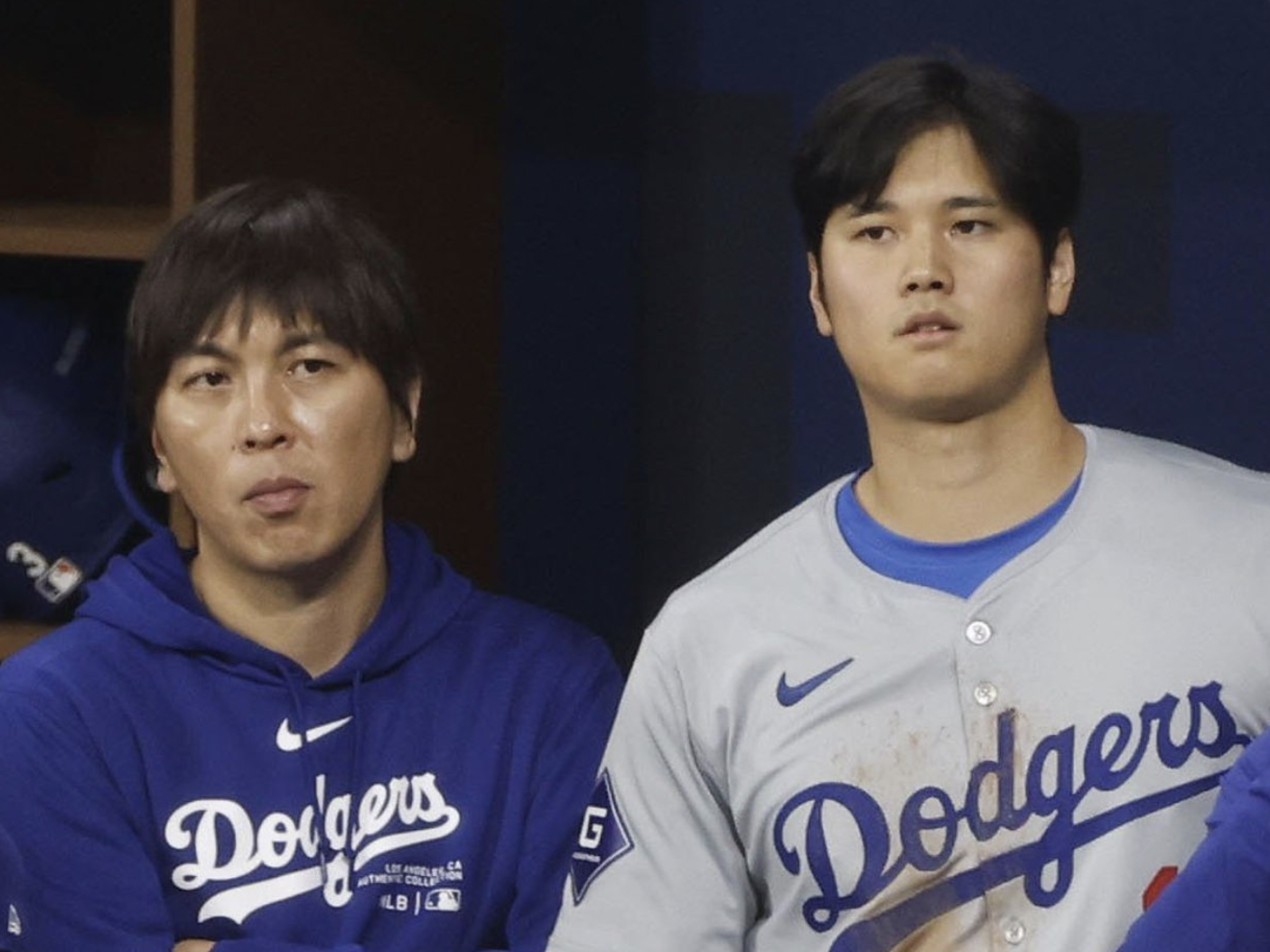
4. How Can One Person Be Assumed To Be Responsible For Such A Staggering and Irregular Volume Of Betting?
As highlighted above, Ippei made 19,000 bets over 26 months, for an average of 25 bets per day. His average bet size was $12,000 per bet, and the sizes of his individual bets ranged from $10 to $160,000 (!?), all contributing to a roughly $40 million net loss.
The volume is simply insane.
Making 25 different $12,000-bets every day for over two years takes remarkable stamina and consistency and is also a terrible thing to do. This is the point-the-tommy-gun-at-the-wall approach to betting, except somehow Ippei's proverbial gun (his endurance, not his funding source) never ran out of bullets.
If you've ever spent any time around a degenerate or a gambling addict, you know that if they were to somehow go on a run at this level for even a few weeks or a month, it would become a noticeable part of them, like a smoker's scent, or the guy who can't help but rage tweet at random plays that don't go his way during a game.
They would watch so much sports, probably, that their day job performance would likely suffer.
They wouldn't suddenly stop cold turkey, for no apparent reason, in January 2024, but instead would likely have been compelled to stop - either through running out of money or through some sort of forceful intervention.
And they would without question at some point wear one or more of their 25 five-figure bets a day on their sleeve.
Now imagine this was being done by your best friend with whom you spent many hours every day (the Los Angeles Times characterized Ippei and Ohtani as "connected at the hip" for their 6.5 year tenure) and who gambled this way for 26 consecutive months
How are we supposed to reasonably believe - if it was solely Ippei who was responsible for the volume - that Ohtani never noticed anything?
Furthermore, is it out of the question to ask whether maybe the reason Ohtani didn't notice is that some or many of the 19,000 bets were not just Ippei's? That maybe the sheer volume and range of the amounts of individual bets is indicative of the behavior of multiple participants? That perhaps multiple people with knowledge of the lucrative funding source backing the bets, rather than one participant who kept knowledge of the situation from everybody - his best friend, his co-workers, major financial institutions, agents, advisors, accountants, and the entire Los Angeles Angels organization – joined in on what was essentially the largest free roll bet of all-time?
It is unclear if investigators have inquired about this. But if they did, and found something to establish this fact pattern, such an occurrence would, if anything, give even more firepower to the scope of the theft and therefore the victimhood narrative that MLB and others are pushing.
Your honor, it wasn't just his interpreter defrauding him, it was his interpreter defrauding him and funding a group of guys' wild betting spree.
5. Is Ippei A Reckless Idiot Compromised By Addiction, Or A Meticulous Mastermind Bent On Calculated Deceit?
Investigators are asking us to at once believe that Ippei:
- Had bet on DraftKings before and so therefore (?) he thought betting through a bookie in California was somehow also legal (ESPN), but was savvy enough to disable someone else's bank alert settings, change their banking credentials, and deceive a major financial institution over and over again in order to access an account and then initiate repeated six-figure wire transfers.
- Was meticulous enough to, for 26 months, never put a single word in writing to Ohtani about anything having to do with his gambling, or any gambling, but dumb enough to try to claw his way out of his $40 million hole by spending more of Ohtani's money on eBay on Ohtani's own trading cards (ostensibly so they could be signed and then sold for money) and having them sent to the Dodgers clubhouse under an alias which he told his employer he was using, but to not worry about (affidavit, page 30).
- Was cunning enough to mis-translate a two-way conversation between Ohtani and Ohtani's agent in real time, deftly to his benefit, while keeping each real-time lie straight in his head and keeping Ohtani totally in the dark (what did Ohtani think he was discussing with his agent on March 18th?), but when asked if he or Ohtani thought that paying off his gambling debts to a bookie would put either of them at legal or reputational risk, said "I don't think either of us thought about that."
- Was diligent enough, in the throes of addiction, to place 19,000 bets across virtually every sport known to man except the one sport he knew best, but was so lazy with his initial interview, weaving a pastiche of lies (Ohtani and I made wire transfers together!), unnecessary elaboration (I'm asking friends and family to borrow money to make ends meet) and partial-truths (I'm $4.5 million in the hole) that would all obviously get found out?
These characterizations are not reconcilable, nor do they buttress, as the affidavit might intend, investigators' claims that this was all Ippei, all the time.
6. Why, Specifically, Do Investigators Think Ippei Never Bet On Baseball?
A coordinated, fervent, almost militaristic talking point has permeated this story from day one. It regards practically the only detail in the saga that has stayed consistent.
The mouthpieces are quick to parrot this talking point before anyone even asks about it. It reeks of the person who isn't yet accused of a specific thing blurting out a denial of that specific thing in a manner that arouses more suspicion than it quashes.
Two important elements from the complaint against Ippei Mizuhara.
— Jeff Passan (@JeffPassan) April 11, 2024
1) The size of his bets -- and the debt he allegedly incurred -- were massive: losing bets of nearly $183 million, winning bets of more than $142 million and $40.7 million in losses.
2) No bets on baseball. pic.twitter.com/ATkaqIAFOp
Everyone’s killing Ippei the interpreter but give him this: he showed good restraint not betting on baseball
— Jon Heyman (@JonHeyman) April 12, 2024
So the wires went from more than $4.5M to upwards of $16M, bets ranged from $10 grocery dollars to $160K, and from 12/2021 to 01/2024 losing ~$183M, winning ~$142M, and being stuck $41M. No bets on baseball.
— Alfonso Straffon 🇨🇷🇺🇸🇲🇽 (@astraffon) April 11, 2024
Here is link to affidavit in all its glory.🙈https://t.co/2MtlIrlE6E pic.twitter.com/U8PsixZJzy
"No bets on baseball."
Let's be honest. Yes, the affidavit concluded this in passing as one sentence in a 37 page document. But to MLB, there are no other sentences in the affidavit. This is the only text. It is the beginning, the middle and the Official Talking Point And Conclusion, and it is being driven publicly by MLB through its media partners.
This is top-down, as is the speedy "conclusion" of the investigation via the affidavit, Ohtani's exoneration and victimhood, etc.
It certainly isn't bottom-up, bubbling up from the common people, a grassroots tour de force of logic based on a plain reading of the facts.
MLB's primary concern is actually not making money from sports betting and suffocating any negative optics that could prevent that from continuing.
MLB's primary concern is not even making sure that Ohanti, the league's most valuable asset, is fully protected - though this is very important to MLB.
MLB's primary concern is, and always has been, ensuring that people don't perceive its games as being fixed, compromised or non-genuine in any way.
MLB cares about the optics of its product, not about the reality. This is because for 99% of fans, the optics are reality.
If you go to the store and buy a carton of milk, and it's expired, you don't just stop buying milk. You can pick another carton that isn't expired. You can buy another brand. You can go to another store that sells milk.
But if MLB's milk is the only milk. If it's expired even once, people will cut out milk entirely. There's no other milk option, and plus - expired milk leaves a bad taste in your mouth.
MLB will say or do anything it can by any means necessary, including pressuring everyone it knows to trumpet the mandatory, pre-determined-out-of-necessity conclusion: that no baseball bets were ever made. The affidavit says it, so it must be true. Nevermind what the affidavit actually said, why it said it, how it came to this in-passing conclusion, or that MLB itself is only just beginning its own investigation, which will undoubtedly go all the way back to the first hour that Ohtani ever stepped foot on U.S. soil to play for the Angels.
The more confidently the "no bets on baseball" assertion is made, the more you should remember these three information points. Then you can draw your own conclusion.
- As if it needed to be spelled out for anyone, Ippei noted to the Dodgers organization and ESPN that he had what can only be described as a devastating gambling addiction. Anyone who barely makes six-figures a year but wagers well over $300 million on credit will likely be devastated for the rest of their lives. You know what people with a devastating gambling addition don't do? Carefully discriminate between the types and levels of sports they wager on, or really, carefully discriminate between anything. They're especially unlikely to discriminate when there's one sport they know better than any other sport, when they're in the hole trying to chase massive losses, and when they're betting 25 times per day on average, including the dog days of Summer.
- The affidavit's source for the assertion that Ippei never bet on baseball is the illegal sportsbook itself. Well, it's actually a low level runner in the bookie's organization. The runner has all the records, you see. Underground criminal operations aren't exactly schooled in GAAP accounting standards, let alone known for the accuracy of their record-keeping. But that's OK, it's all right there in the spreadsheet. We, the illegal bookmakers who garner implicit trust, checked all 19,000 very reliably tracked bets and none were on baseball. The affidavit notes that the low-level guy hasn't been charged yet, but might benefit from working with the feds by
showing them the right evidencehelping them out. It is in everyone's interest, including the bookmaker's, to make it seem as if no betting on baseball occurred. What illegal bookie would want to, on top of already breaking the law on a massive scale and likely seeing life-ruining penalties on the horizon, also want to add on the negative optics before their possible indictment of allowing a player to bet on his own sport? That will earn you a personal hit from Rob Manfred's private mafia. - A three-day period in June 2023 detailed in the indictment constitutes a particularly bad look on this question. Ippei, appearing from obtained text messages to have lost bets during each of those days, requests and appears to receive a "bump," or an enlargement of his already massive credit line, each day. What was going on in professional, relatively-U.S. relevant sports between June 22-24, 2023? No NBA. No NFL. No NHL. No College Football or Basketball. So, what was he getting millions down on in late June on a daily basis? The Travellers Championship? The Halle Open? Darts? Keirin? He averaged 25 bets per day. So even over that three-day period, if he made 75 bets, we're supposed to believe that they were all on, like, the MLS, and not one was on the only Big 4 sport (and the most popular Japanese and Korean sport) transpiring at the time?
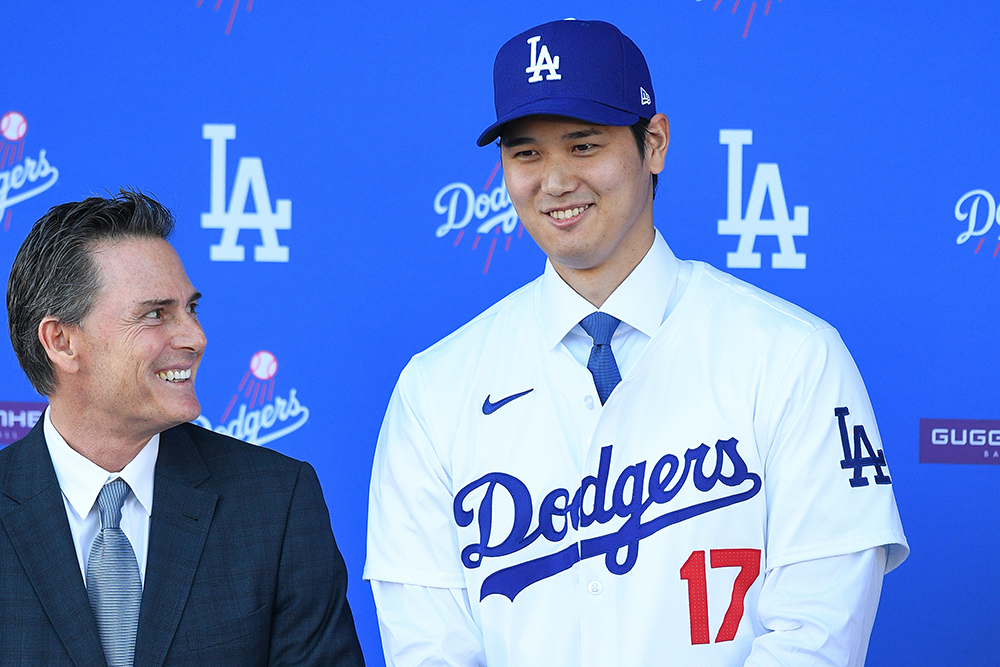
7. Was Ohtani Generally Aware Of, Or Generally Unaware Of, His Personal Financial Accounts And Their Assorted Management (And Where Were Those Who Had A Fiduciary Responsibility To Ohtani)?
I believe there are two potential scenarios here and that they are likely mutually exclusive.
- Scenario 1: Ohtani was generally unaware of his financial dealings and the management of this financial accounts, because he had (or thought he had) other people managing his money and his bookkeeping. In this case, he would have had multiple account signatories and money managers, wouldn't be paying close day to day attention to his account, and could have been so hands off that he could have been defrauded without knowing right away.
- Scenario 2: Ohtani was generally aware of, involved in, and protective over his financial dealings, in which case it's highly implausible to not notice $16 million leave your account in $100,000, $500,000 and $1 million increments over 26 months. In this case, Ohtani would be the only signatory on his account and genuinely did want it kept private from other people.
The affidavit states that while Ohtani believed his accountants, managers and financial advisors managed or at least had access to all of his accounts and income sources, that in reality they managed and had access to every account except the salary account that Ippei defrauded.
Ohtani was the only signatory on this account and according to the affidavit, Ippei told practically everyone Ohtani had ever met that this account, the one that got millions of dollars in salary dumped into it and had to have had personal tax and accounting implications for Ohtani, was to not be viewed by anyone.
The alleged pushback on this request from the people who had a fiduciary responsibility to Ohtani, his bookkeeper and his accountant, was the equivalent of a limp windsock.
J.C. was concerned that the lack of access to the x5848 Account created possible tax liability for Victim A if the x5848 Account accrued unreported interest or was used to make gifts in amounts necessary to be reported to the IRS.
During that meeting, K.F. asked MIZUHARA about the x5848 Account, and stated that Victim A risked filing incorrect tax returns if there was interest being generated by any funds in the x5848 Account or any gifts from that account which triggered tax reporting requirements.
Yeah! That would be weird and concerning. But it's OK. Ohtani's agent, who hired the bookkeeper and who also didn't have access to that compromised account, told the accountant that it was fine. So did Ippei.
(The Accountant) asked MIZUHARA about the x5848 Account, and stated that Victim A risked filing incorrect tax returns if there was interest being generated by any funds in the x5848 Account or any gifts from that account which triggered tax reporting requirements.
MIZUHARA responded that Victim A wanted the x5848 Account kept private from everyone, and that the x5848 Account did not bear interest and that there were no gifts from the x5848 Account
So, it seems at first blush that this is Scenario 1 all the way. Even though others were apparently not minding the store due to purposeful deceit, Ohtani thought that others were minding the store and so he played a passive-at-best role in his own financial affairs.
Except, Ippei himself wasn't even a signatory on the account that Ippei defrauded until late 2021, at which time he pulled off the initial banking credentials switcheroo and notifications turn off that allowed him in part to pose as Ohtani and initiate wire transfers.
Which implies that the only signatory on the account from 2018 to 2021, and actually the only person who had access to it during that period, was Ohtani. Ohtani was with Ippei when they established the account in March 2018 at the bank in question. Ohtani would have therefore known that his was the only name on the account and likely would have assented to this form of set up.
If Ohtani was truly the only one with access to his bank account for three years (before Ippei compromised it), then it would seem that Ohtani really did want the account kept private and ostensibly he did pay attention to his account, because was the only person who could pay attention to it. Someone had to pay attention to it.
Thus, the affidavit envisions part of Scenario 1 (all along, Ohtani was out of it and believed that several other people were managing all his accounts) and part of Scenario 2 (from 2018 to 2021, Ohtani was the only signatory on the account, and Ippei had not yet compromised it, indicating therefore that Ohtani had an interest in and awareness of his own finances).
Did Ohtani suddenly in late-2021 go from keeping relatively normal tabs on his own salary bank account to not desiring any oversight or involvement in it at all? Did his agents and accountants and attorneys at one point have access to the account and then were taken off? If so, how and why would any financial professional go along with that?
(Also, RIP to Ohtani's taxes getting properly reported every year).
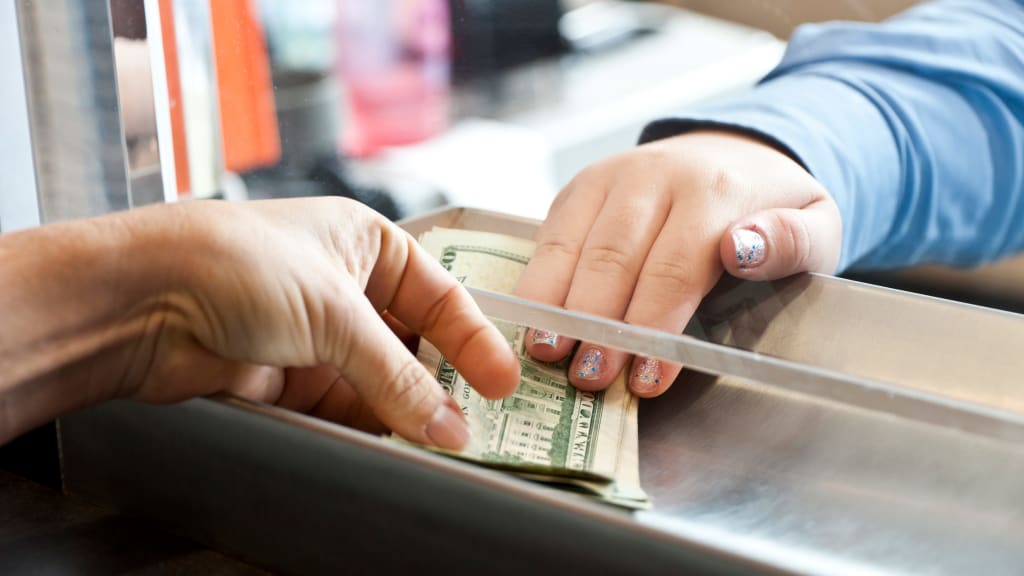
8. Who Is Minding The Store At Bank A's Fraud Department?
As discussed above, Ohtani was and remained the only signatory on the compromised account, even though at some point Ippei transferred the phone and email associated with the account to a phone number and "anonymous" gmail account that was not Ohtani's.
This altering of the banking credentials effectively gave Ippei the ability to impersonate Ohtani logging on to his bank account, and to initiate wire transfers. But the transfers still needed to be confirmed by "Ohtani," the only signatory, verbally with the bank.
So, Ippei posed as Ohtani on the phone and confirmed away. Many times.
Banks get deceived. There is fraud that occurs. But they are generally not often tricked by just a guy on the phone over a period of several years to the tune of many, repeated fraudulent transfers totaling millions of dollars.
Before the verbal deceit and logging in with swapped credentials became regular practice, Ippei's wire transfers were getting stopped initially, according to messages Ippei wrote to his bookie that the affidavit cited.
From October 2021 to February 2022, Ippei made multiple attempts according to the affidavit to wire funds, and the wires didn't go through. Then he tries other methods: He attempted to transfer the funds via PayPal. He contemplated structuring (sending large sums of money by sending several much smaller, less eye-catching sums of money). He even asked if he could pay by other means such as credit or debit card. I would love to know which debit card Ippei had access to with an available balance of $300,000.
So, something initially was working.
But then, like magic, the wires started going through routinely. Ippei told both the bank and ESPN that the payments were "loans," according to the affidavit. And as the named signatory on the account, Ohtani's name – an immensely recognizable one due to his stature as being the highest paid athlete of all time – was literally printed on each wire transfer itself.
Every time that the bank verbally verified, it spoke to Ippei on Ippei's phone, per the affidavit, and then saw this transfer with "Ohtani" written on it.
Did the bank never check public or other records to see if the registered phone number or email might show up as belonging to anyone other than Ohtani?
If the wire transfers were not marked as loans, what were they marked as?
If the transfers were marked as loans, did Ippei's bank ever ask itself for what purpose a baseball superstar was repeatedly loaning money?
Did the bank ever ask if the loans were paid back? Virtually the only money that came in to the account was salary; All of Ippei's gambling winnings went to Ippei's personal bank account.
Ippei also needed to provide the full name, account details, address and phone number of the illegal bookmaker to whom he was sending the money.
Did Ippei's bank ever once look into the as-of-that-time highly unusual pattern of inbound transfer activity?
Did Ohtani's bank ever look into who the repeated recipient of his outbound transfers were? Maybe give the bookie a call at the phone number that Ippei provided?
Did the illegal bookie's financial institution ever look into the source of the bookie's funds, Ippei's or otherwise?
While we're discussing irregularities, a question put back to the popular refrain that $16 million going missing is totally understandable because to star athletes and their people, that's a mere blip on the radar:
8b. How Did Ippei Wring $16 million Out Of An Account That, Up Until Some Time In 2023, Had At Maximum $6 Million Deposited Into It Cumulatively?
To refresh:
- Ohtani signed the $700 million deal with the Dodgers was almost exactly when Ippei's betting is said to have abruptly ceased in January 2024. Even if he had signed it long earlier, Ohtani deferred $680 million of that $700 million deal until 2034.
- As for endorsements, the affidavit says that no endorsements or investment returns were paid into the account that Ippei continually defrauded.
- Leading into the 2023 season, over halfway through Ippei's 19,000-bet run, Ohtani's lifetime MLB earnings were around $12.2 million, pre-tax.
- Per the affidavit, the compromised account was "almost exclusively funded by deposits identified as payroll, in the name of the (Los Angeles Angels)."
Exclusively, you say?
$2.3 million of Ohtani's pre-tax $12.2 million came in the form of a signing bonus with the Los Angeles Angels in 2017, earned before the compromised bank account was even in existence – Ohtani and Ippei opened the bank account in March 2018.
It's safe to say that the remaining $9.9 million was deposited into the account over the next 5 years, at which point roughly the Angels started awarding Ohtani's first massive U.S. payday, his $30 million 2023 salary, began being awarded in paycheck-by-paycheck increments.
So, from March 2018 to March 2023, $9.9 million in pre-tax salary was deposited into the account.
The marginal federal tax bracket alone for the majority of that $9.9 million was around 37%. With California state income tax, let's call it 40% all in.
60% of $9.9 million comes out to roughly $6 million that we can reasonably expect was deposited into Ohtani's account over that five-year span.
If Ohtani spent none of that $6 million, then Ippei, who was making $500,000 wire transfers like they were going out of style, would have at maximum $6 million to blow. If Ohtani ever spent any of his salaried income on anything, which in spite of his ability to live comfortably off of endorsements alone seems more realistic, then Ippei would have had less than $6 million to blow.
Unless there was some non-investment, non-endorsement, non-salary source of income that Ohtani initially seasoned the account with (his Japanese baseball earnings pre-MLB weren't particularly eye-popping – as a fifth-year star he lived in a dorm and didn't own a car), Ippei must've been riding this thing pretty close to zero up until a few of the big Angels checks in 2023 started to hit.
This would not have been something the bank would have necessarily cared about – people load up accounts and draw accounts way down all the time. But it poses one of two simply mathematical questions.
The other is...
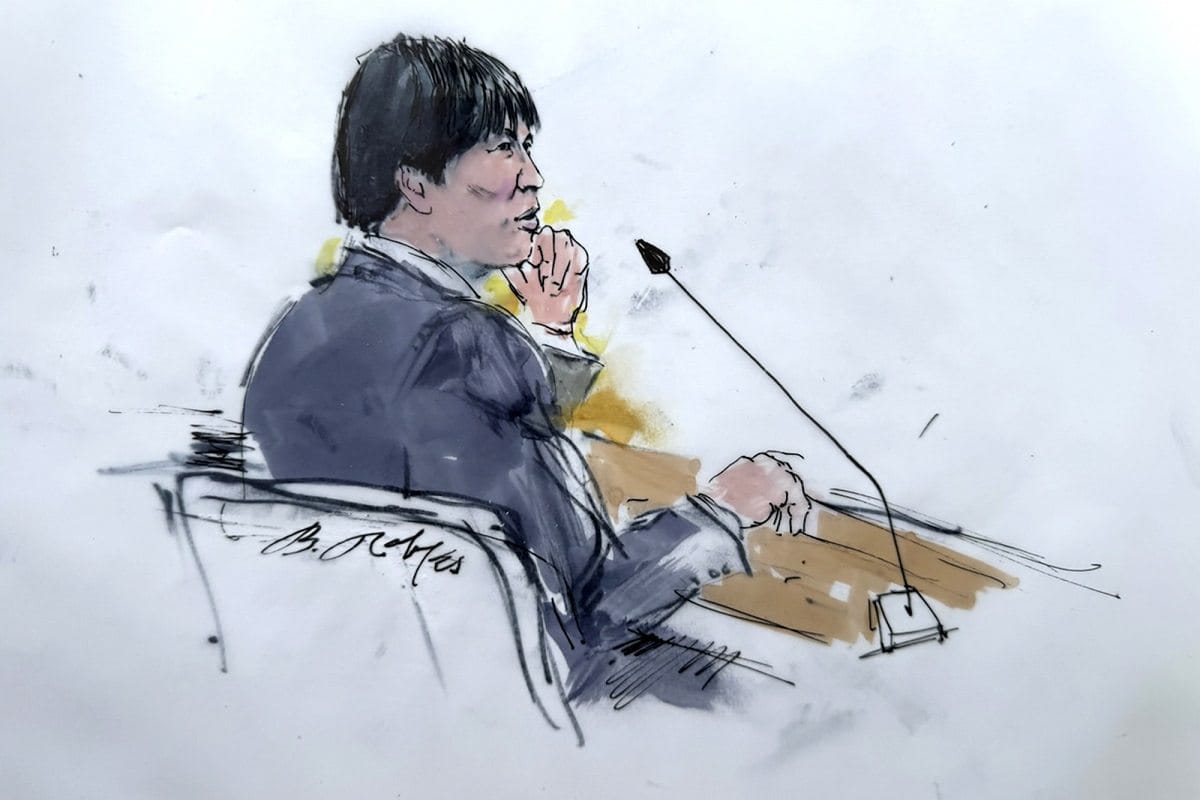
9. Who Is On The Hook For Ippei's Other $24 Million In Losses?
When you factor in assumed vig on his roughly $140 million in winnings, Ippei likely wagered around $350 million. Again, his net loss was about $40 million.
Ippei defrauded Ohtani of $16 million.
That leaves $24 million that was just... not paid up? Was paid by another of Ohtani's accounts that was also defrauded? Was paid by someone else?
In general, bookies don't just let this stuff go. They really don't let $24 million go. And as stated above, at multiple points in the affidavit Ippei appears to be substantially behind on his payments to the bookies, and they pressure him to pay.
Toward the end of Ippei's mad run in particular, the bookmaker and his associate expressed increasing concern with not getting paid on time.
At several points throughout the affidavit the bookies express frustration with Ippei about not receiving the amount of money necessary to continue garnering the gigantic level of credit he has been extended.
It threatened to get ugly at points, as noted in this understatement of the century from the bookie, Matthew Boyer.
On or about January 6, 2024, BOOKMAKER 1 messaged MIZUHARA stating “you’re putting me in a position where this is going to get out of control. If I don’t hear from you by the end of the day today it’s gonna [sic] be out of my hands.”
...as well as in this oft-cited exchange from the affidavit in which Boyer says:
“Hey Ippie, it’s 2 o’clock on Friday. I don’t know why you’re not returning my calls. I’m here in Newport Beach and I see (Ohtani) walking his dog. I’m just gonna go up and talk to him and ask how I can get in touch with you since you’re not responding?
As noted earlier, it's already straining credibility to imagine there was enough in the account pre March 2023 to fund $16 million in debts. It's equally straining to believe that even after the entirety of Ohtani's $30 million 2023 salary hit, there would have been enough post-tax money in the salary-only account Ippei defrauded to pay an additional $24 million that was owed (which could explain, if Ippei in fact only defrauded one Ohtani account and had a single funding source, why Ippei eventually fell so behind on his payments).
Did Ippei have other funding sources - Ohtani's or otherwise - that he was preparing to pay off the remaining $24 million with?
Did he pay it off, but other via other fraudulent means?
If Ippei didn't pay off the other $24 million in debt, or at least have a way that he was preparing to do so (baseball cards!), then how does the betting ring plan on obtaining the remaining $24 million it's owed?
Boyer's ring is likely still continuing business. While the bookie's home was raided last year, he has not been charged. The betting ring itself was staffed by many people, and is likely still conducting business (A Washington Post story regarding a separate but potentially connected Southern California betting ring whose leaders were recently criminally indicted, notes that that betting ring is still operating, just with non-indicted staff at the helm).
Do we think Boyer's ring, or other downstream creditors, are going to just let the $24 million go?
The ultimate nightmare scenario for MLB is someone coming after Ohtani personally to recover more of Ippei's gambling debt.
If the majority of the debt isn't paid, then this is still an active nightmare for not just MLB, but for the Dodgers, fans of baseball, law enforcement, and Ohtani himself.
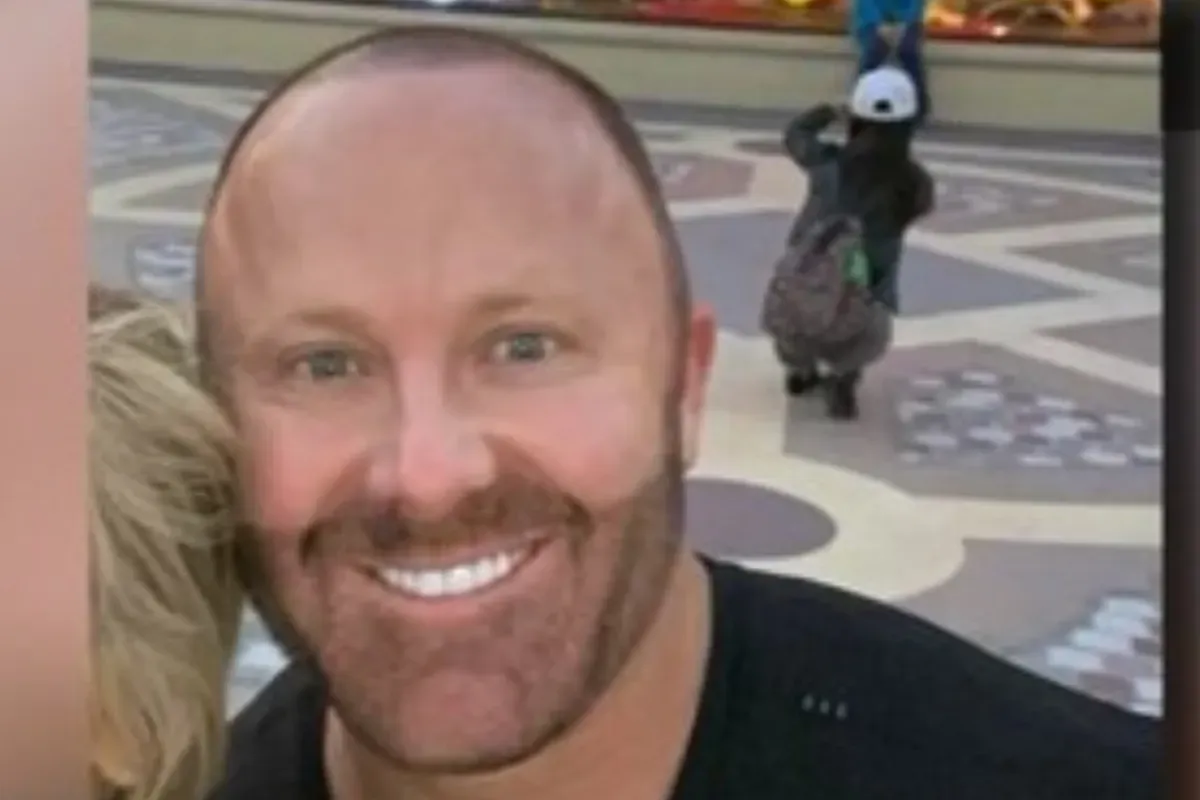
10. Why Did The Bookie Familiarly Reject Ippei's Characterization That Ippei Stole From Ohtani?
Ippei's annual income over the course of his betting ranged from somewhere between $85,000 and $500,000, according to reports. Regardless of what his income was exactly, his betting handle was in the hundreds of millions of dollars.
Ippei was clearly getting the money to fund his gambling from elsewhere. If one had any doubt that the bookies had any doubts about how Ippei's gambling was funded, note Ippei's alleged text to Boyer:
"As you know, you don’t have to worry about me not paying!!”
And the bookie's text to Ippei in June 2023:
"To be honest with you Ippie, as long as you can guarantee the ($500,000 payments) every Monday I’ll give you as much as you want because I know you’re good for it."
We also know that Boyer was aware of Ippei's relationship to Ohtani because, as mentioned above, he thought about approaching Ohtani to get money Ippei owed to him.
Boyer was likely aware of the relationship from the minute he first met Ippei, which occurred at a poker game at the team hotel in San Diego where Ippei attended along with then-Los Angeles Angel, and Ohtani's friend and teammate, David Fletcher.
If I'm Boyer, and I know that I'm dealing with a customer/s whose 25 bets and $300,000 wagered per day is funded by an MLB player's income, I'm thinking that either:
- Ohtani (and maybe others) are all in on it, with several people doing a bunch of gambling, that even if Ohtani isn't betting at all he's at least bankrolling it all, and that Ippei is effectively the coordinator of all the action. Or;
- Ohtani has either turned a blind eye to all of it and/or Ippei is stealing the money from his Ohtani.
Either way, over the course of my multi-year relationship processing Ippei's 19,000 bets, over the course of my "hundreds of pages of text messages" that constitute my communication with Ippei, I'm probably going to talk to Ippei about it and try to figure out who my true customer is.
If I find out that Ohtani is blessing the activity, then I'm then going to quietly brag about it in the right circles - think Wayne Nix on the golf course with Michael Jordan - to gain credibility and more business. If I find out that Ohtani isn't blessing the activity and is unaware, then I'm probably going to keep my mouth shut. Per Yahoo, the Boyer did the former, not the latter.
Secondly, if I find out Ohtani is blessing the activity, I'm probably far more comfortable extending massive credit lines to Ippei and have far more comfort that I'm going to get paid. Per the affidavit, Ippei was extended the grandaddy of all credit lines despite himself making low-six figures per year.
Conversely, if Ippei is stealing the money, then Boyer's risk calculus for getting paid is very different than the risk calculus of servicing a funding source that approves of the betting. In both scenarios, everybody has to keep their mouth shut. But when people steal, people get caught. When people get caught, Boyer doesn't get paid.
Boyer claims he personally floated half of Ippei's debts to his (Boyer's) business partner every week.
It’s just imperative that the 500 is sent every week as you can imagine the figures are very high and just don’t want to not be able to deliver what I tell him. FYI I have already paid out of my pocket to him half of the balance that is on the account so whatever is lost every week I have to give him half of the balance that’s why I’m asking these direct important questions.”
When Ippei flagged for Boyer the "Massive theft" story that came out on March 20th via Ohtani's lawyers, Boyer appeared to have a clear opinion of, and apparent familiarity with, the nature of Ippei's business.
Ippei: “Have you seen the reports?”
Bookmaker: "Yeah, that's all bullshit. Obviously you didn't steal from him. I understand it's a cover job, I totally get it.
Ippei: "Technically, I did steal it."
Technically.
10b. What Does "Technically," Mean?
This exchange is perfect because there's something in it for everybody. If you want it to be the end-of-story smoking gun, it can be the smoking gun. If you want it to open up a much more expansive scope of inquiry, then that works, too.
MLB and prosecutors chose Door Number 1.
Again, if I'm Boyer or one of his associates, and I know that I'm owed and additional $24 million, and that the money machine has just been turned off because my degenerate runner Ippei is about to be booted off the face of the planet, then I'm going to start asking questions.
When Ippei says, "Have you seen the reports?" Boyer doesn't start asking questions. He doesn't express shock and confusion. He doesn't say, "this isn't what you told me" or "did you deceive me?" or "I thought Ohtani at least knew about this?" or "Wait...you didn't actually steal this, right?" He doesn't ask for more information to learn more about who is investigating what and who might potentially be involved.
Boyer doesn't ask, in spite of frequently asking for the past two years how and when he's going to get paid the rest of what he's owed, how and when he's going to get paid the rest of what he's owed.
Instead, Boyer's first and only (?) response is to scoff, and exhibit a pre-formed opinion that Ippei didn't do this without Ohtani's consent.
From what is Boyer's opinion pre-formed?
Why would he think there is something to "cover?"
Maybe Ippei lied to the bookmaker, too, and incorrectly gave him the opinion that Ohtani was at least blessing the payments, or that Ippei magically had a separate multi-million funding source. But the direct and unquestioning nature of Boyer's response doesn't track with a normal reaction when hit with a bad, surprising, bombshell revelation.
And then, there's the use of "technically."
Sometimes you use the word "technically" to underscore maybe an unconventional or second-order realization you're trying to make.
"You're right, honey, I technically did raise my voice when we fought earlier and I shouldn't have done that."
But a lot of times you use it when you're trying to twist one reality into a different, specious reality.
"I mean, guys, I finished an online course from Harvard and got a certificate of completion /sips beer/ so technically, I studied at Harvard."
Regardless, the same day that Ippei redacted his entire scripted, Ohtani-camp-approved story to ESPN, and the same day he said like a hostage to ESPN regarding a group of people who don't represent him, "they told me I can't answer anything" before hanging up the line, he sent a short message to his bookmaker that he stole everything. Technically. Voluntarily. With no further discussion or explanation.
Why?
The consensus here should be that the Ippei Mizuhara scandal is inexplicably weird and that there is no definitive consensus – not that we should all forget it ever happened as quickly as possible.





